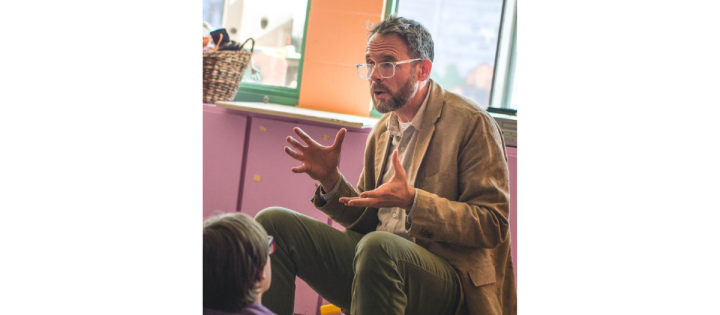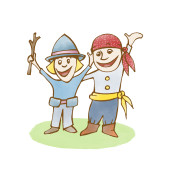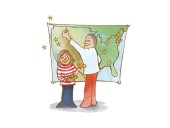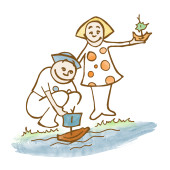Storytelling as a Parenting Tool 101
The world is made of stories.
This is not meant to be esoteric, philosophical, or tongue-in-cheek. This is simply how things are. Our understanding of the world: the names we use, the science and history we document, are all composed of stories we have told and continue to tell. Storytelling is uniquely human in that stories give us context and help us grow. It is through stories that we process meaning and integrate anything new into our current understanding of reality.
This group of neuroscientists tells us that reading about experiences in books lights up the brain in the same way that physical experiences do — there’s no distinction. Stories = Reality. That’s why navigating the world means navigating stories.
And in a world made of stories, the storytellers hold the keys.
Storytelling Tips for Beginners
Tap into Narrative Storytelling
We each have a “golden thread” that includes our upbringing, our schooling, our work, our relationships and for some of us, parenting. Things seem twisty and turny and there are chapters that don’t seem connected to other chapters. That’s where narrative storytelling comes in. Those golden threads are all part of YOUR story, and it is YOUR story that will be the foundation of your storytelling. Your life is unique in all the world. It is fascinating because everyone’s life is fascinating — especially to a child.
My Own Story
For instance, my story includes moving around a lot as a child, and thus, the ability to reinvent myself every few years. I found theater and then film and then visual art, and when I graduated with my art degree, I promptly traveled around the country on bicycle and then Volkswagen bus to find where my professional storytelling life would begin. Again, it was film in Austin and then teaching in New Hampshire andVermont, where my wife at the time, Lisabeth, came up with the idea that we put my love of telling stories to work and start a storytelling business: Sparkle Stories.
Sparkle was not only a satisfying place to use the skills and gifts I had developed up to that point, but it also turned out to be useful to other families. It was the perfect marriage of where my passion met a need in the world.
That’s how I see and tell my own story about my life in a way that makes sense of all the disparate experiences and deepens my appreciation for what I’m here to do.
Do you see how that can make a difference in my day-to-day?
You have the power of story at your fingertips, to support your own experience and especially that of your children.
The Most Important Storytelling Tip
This leads me to the most important storytelling skill there is. And it’s a very simple one!. The most important storytelling tip I can give you is this: just do it.
Seriously. This is the most common reason people don’t get better at their storytelling: because they don’t even try! They have this belief that storytelling is only for the professionals. But this is like saying singing is only for the professionals. We all sing! We might not do it publicly or professionally, but we all sing. The same is the case for storytelling.
So if you get anything out of this article, it is this: just tell stories. Tell them badly. Tell stories from your childhood. Tell stories that you make up on the spot. Tell clunkers. Be boring. Have no plot. Have inconsistent characters — it doesn’t matter. What matters is that you are willing to try.
THIS is the best storytelling tip I have — and what will resonate with your children the most.
Storytelling Tips for Parents
For those of you who are officially willing to try, the good news is that there are some basics that will make this a lot easier for you. Again, don’t let any of the following tips keep you from the most important part of storytelling: actually doing it. So please use this advice to ADD to your process, not keep you from doing it. These tips are geared toward telling made-up fictional stories, but the principles still apply for telling your own real-life stories.
- Make up stories on the spot. Some of you may feel that you need to have a plan and to prepare and even practice telling it in advance of bedtime or whenever you want to tell your stories. I discourage that. In my experience it isn’t sustainable, and besides, it’s far less fun or interesting. No, I recommend sitting down, opening your mouth, saying “Once upon a time,” and then seeing what happens.
- For some of you, this seems stressful and too risky. You wonder if you’ll have anything to say. Well, here is the powerful tip: look around the room and when your attention rests on something — start your story there. Teddy bear? Tell a story about a bear. Sound of a fan? Tell a story about the wind. Smell of toothpaste? Tell a story about a mint fairy. With practice this will become easier and a ton of fun for you and your listener.
- If this still seems overwhelming, have family listening time when you all listen to a Sparkle Story, and then consider using the same characters and environment and tell your own! Tell one about Zippy, the adorably slow porcupine in Junkyard Tales. Or one about Dish, the opinionated cat in Libby & Dish. Or one about a fairy that your child enjoyed from the So Many Fairies collection. And let your child be a part of the telling. If you don’t have an idea, they certainly will. The point is to lower your standards and remember that a poorly told story is better than none at all!
The Benefits (and fun!) of Storytelling
Here is something that might not have occurred to you as you consider spinning a yarn with your family: it gives you energy. It delivers calm, steady, empowering energy. It feels great. There is a regulating and calming effect that storytelling has on the nervous systems of both the listener and the teller. We have all experienced it, whether through hearing stories told live or recorded stories like Sparkle Stories. Storytellers are different from other entertainers in that it’s their job to disappear and let the story do the work. This is not a privilege of the pros, this is a major benefit to anyone that decides to tell a story out loud. We slow down. We become present. We allow for long pauses. We taste the words of the story. We can imagine all the details and lose ourselves in them. We experience magic. And when the story is over and our children heave a sigh of satisfaction, we realize that we, too, feel better. We feel calm and strangely energized. We feel a second wind, but not a tinny, caffeinated one. More like the steady hum that meditation or yoga gives you. And it was completely free!
Using Storytelling in the Rest of your Life
Here is some more good news, and this ties in with the opening paragraph. If the world is made of stories, and storytellers hold the keys—- then why stop at telling bedtime stories? We tell stories, whether we admit it or not, all day long. The answer to most questions are stories. When we recount something from earlier in the day, it is a story. When we describe something or something, we are telling a story. So if we are telling stories all day long, doesn’t it make sense for us to get better at that storytelling, too? Maybe we slow down our speech. Maybe we linger over choosing just the right word. Maybe we taste that word as we say it. Maybe we offer generous pauses so the listener can fully integrate what you are saying.
If you start to see much of your speech as storytelling and decide to get better at it, then all the good feeling that comes from storytime at night gets spread throughout your day. And before you know it, you are living a storied life.
So listen to more stories, tell more stories, enroll your kids in Story Steps classes and if you want to learn more storytelling tips (and even get trained in Restorative Storytelling) then find me here.
Stories to Help Jumpstart Imagination
Here are some of our best "Storytelling" Sparkle Stories to help inspire and get you started!
About the Author

David Sewell McCann
David Sewell McCann fell in love with spinning stories in first grade – the day a storyteller came to his class and captured his mind and imagination. He has been engaged in storytelling all of his adult life through painting, film-making, teaching and performing. Out of his experience as a Waldorf elementary class teacher and parent, he has developed a four step method of intuitive storytelling, which he now shares through workshops and through this website.




